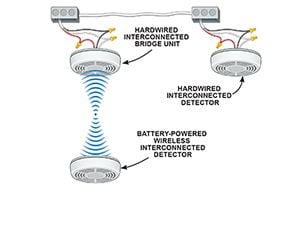
Kidde Wireless Smoke Alarms enable you to extend the coverage and protection of interconnected smoke alarms —without any need for additional wiring ! This alarm uses ionization sensing technology. Ionization sensing alarms may detect invisible fire particles (associated with flaming fires) sooner than photoelectric alarms. Use this smoke detector to replace an existing hardwired smoke alarm and then install additional First Alert Wireless alarms for an interconnected safety network (additional alarms sold separately). The Kidde Wireless AC Powered Smoke Alarm makes it easy to expand the coverage of a current interconnected system. Kidde Wireless Battery Powered Smoke Alarms can be installed in additional rooms that need extra protection.

Interconnected Smoke Alarm with Hardwire Adapter Included Hardwired alarm can communicate wirelessly with other compatible alarms to create. When one alarm is triggere all connected alarms will sound. Wireless Interconnect alarms communicate with each other wirelessly through interconnected radio frequency. Integrated battery backup allows continuous detection during power outages. It is possible to have wireless smoke detectors that are hardwired ! If you have a pre-existing interconnected hard-wired smoke detector network , a First Alert SA521CN-3ST (sometimes sold as simply the First Alert SA521CN) can be substituted for one of the existing units to act as a bridge so that when one smoke detector is activate all smoke detectors on both networks will sound an alarm.
It also has a horn tone with low frequencies for the hearing impaired and elderly. Why are hardwired smoke detectors the very best? Do I need to test my hard-wired smoke detectors? What is better, hard wired or battery smoke detectors?
Do You need a hardwired smoke alarm in Your House? Shop first alert wireless interconnect ac hardwired 120-volt photoelectric sensor smoke detector at Lowes. Hardwired interconnect and RF Interconnect: reliable and secure radio frequency communication between alarms. MHz frequency with 60security codes and channel frequency hopping. Optipath 3TechnologyTM - patented technology provides 3degrees of direct access to the smoke sensor.
Make the job quicker by adding a KA-F Quick-Convert Adapter when replacing another brand alarm with a Kidde manufactured alarm. View the specifications first, to ensure compatiblity. Wireless systems use signals that are transmitted through a radio bandwidth in order to alert you to smoke or a fire. If a fire does break out, there’ll be no damage to wires.

Conversely, in a wired system, the wires can be damaged before the alarm is triggered. The best bet is to invest in a hard-wired smoke detector with a backup battery for an interconnected smoke detecting system that still works during an outage. First Alert offers homeowners a variety of combination smoke and carbon monoxide (CO) alarms that provide 2-in-protection against both smoke and CO. Shop our line of combination smoke and CO alarms including battery operate hardwired , and 10-year sealed battery alarms to find the alarm type that best works for your home and family.
V AC hardwired wireless detectors with battery backup integrate single alarms into a system. Most of the hardwired smoke alarms are connected to a power source that is mostly 120V alternating current. The batteries are provided as back up in case of main power outage. Today, there are also countless number of smoke detectors that are not hard wired smoke detectors.
They are either battery operated or wireless. Easily link alarms with the press of a button. This hardwired alarm includes a 9V battery backup in case of a power outage, and it can be used as a standalone unit or part of an interconnected system. The primary purpose of wireless interconnected smoke detectors is to keep your family and property safe by alerting you of potential fires as soon as possible.
A nice-to-have feature, however, would be integration of these devices with your smart home automation system. Can I replace my wired interconnect alarms with wireless interconnect alarms? The NFPA doesn’t have a preference for either wired or wireless interconnect. Additionally, the International Residential Code considers smoke and CO alarms with either wired and wireless interconnect to be equal under its most recent model building code.
To the best of our knowledge, there are no state building codes that require hard-wire interconnect for your smoke and CO alarms. With hardwired smoke detectors , they can be connected together so that if one goes off, they all are triggered. This interconnection can save precious minutes if a fire occurs in an area of your house and has a chance to spread before you are fully aware. Smoke alarms shall be permitted to be battery operated when installed in buildings without commercial power.
Hard wiring of smoke alarms in existing areas shall not be required where the alterations or repairs do not result in the removal of interior wall or ceiling finishes exposing the structure,. Ionization technology smoke alarms are generally more sensitive than photoelectric technology smoke alarms at sensing small particles, which tend to be produced in greater amounts by hot, flaming fires, that are consuming combustible materials rapidly and may spread quickly. This provides more warning in more places, giving families more time to escape a fire.
No comments:
Post a Comment
Note: Only a member of this blog may post a comment.